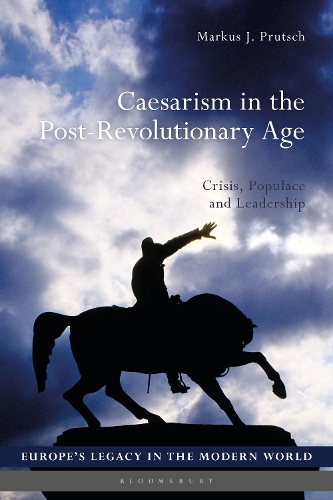
Caesarism in the Post-Revolutionary Age: Crisis, Populace and Leadership
(Paperback)
Publishing Details
Caesarism in the Post-Revolutionary Age: Crisis, Populace and Leadership
By (Author) Markus J. Prutsch
Bloomsbury Publishing PLC
Bloomsbury Academic
22nd April 2021
United Kingdom
Classifications
Tertiary Education
Non Fiction
Political ideologies and movements
900
Physical Properties
Paperback
240
Width 156mm, Height 234mm
426g
Description
This book is open access and available on www.bloomsburycollections.com. It is funded by Knowledge Unlatched. Debates about the legitimacy and essence of political rule and the search for ideal forms of government have been at the very heart of political thought ever since antiquity. Caesarism in the Post-Revolutionary Age explores the complex relationship between democracy and dictatorship from the 18th century onwards. More concretely, it assesses how democracy emerged as something compatible with dictatorship, both at the level of political thought and practice. Taking Caesarism a political alternative somewhere between democracy and dictatorship as its key concept, the book considers: * To what extent was Caesarism seen as a new post-revolutionary form of rule * What were the flaws and perils, strengths and promises of Caesaristic regimes * Can 19th-century Caesarism be characterised as a prelude to 20th-century totalitarianism * What is the legacy and ongoing appeal of Caesarism in the contemporary world This study will be of value to anyone interested in modern political history, but also contemporary politics.
Reviews
By exploring Caesarism as a plebiscitarian form of autocratic leadership from the French Revolution to the present, Markus Prutsch helps us place the current crisis of liberal democracy into historical perspective. The author cogently demonstrates that the rise and fall of popular dictators must be understood as an integral part of the history of modern democracy. * Manfred Berg, Professor of History, Heidelberg University, Germany *
Incisive, lucid and original, this study of Caesarism is a major contribution to an understanding of 19th-century European political history. * Timothy Blanning, Professor of History, University of Cambridge, UK *
In Caesarism in the Post-Revolutionary Age, Markus Prutsch takes us on a fascinating journey from the French Revolution to the 20th century. This book is a detailed and subtle explication of a desire for heroes and saviours doing what is deemed necessary to dispose of political systems that are perceived as unjust or rotten. * Gerhard Casper, President Emeritus, Stanford University, USA *
A remarkable historian is needed to broach the sprawling, amorphous and seminal concept of Caesarism in the history of modern Europe. Markus Prutsch is exactly that. Few modern scholars have the intellectual dexterity, linguistic skills or the historical hinterland to construct a coherent study of the place of authoritarianism in so dynamic a period of history, but Prutsch has all these qualities and has done exactly this. A work of formidable scholarship and powerful intellect. * Michael Broers, Professor of Western European History, University of Oxford, UK *
Author Bio
Markus J. Prutsch is Senior Investigator and Administrator at the European Parliament, and Associate Professor of Modern and Contemporary History at Heidelberg University, Germany. He has a PhD from the European University Institute in Florence and is a Fellow of the Heidelberg Academy of Sciences and Humanities.
